s2839032
The issues of defining terrorism: implications of the definitional debate for policy
practices
The issue of defining terrorism as reflected in practice
State of Art and Its Discontents
24/05/2024
Word Count: 3282
, The issues of defining terrorism: implications of the definitional debate for
policy practices
Introduction
Since the origins of the field of terrorism studies, there have been endless debates on almost
every aspect of it. Few of these debates have been as complex and longstanding as the debate
on the academic definition of terrorism (Lentini, 2008; Weinberg et al., 2004). It appears that,
concerning the academic definition of terrorism, scholars have simply agreed to disagree
(Stampnitzky, 2013). Terrorism, as a contested concept, still has no universal academic
definition, nor a legal one (Jenkins, 1980; Schmid, 2012; Weinberg et al., 2004). Yet, after
9/11, counterterrorism practices emerged rapidly, outlining diverse strategies, some based on
scholarly literature, others less so.
While the field of terrorism studies has been incredibly helpful in grasping such a
complex phenomenon, it is of great significance that the quality and applicability of this
research are continuously scrutinised, especially considering the importance of terrorism
research in developing and evaluating practices. Conflicting research could, after all,
eventually lead to conflicting policies (Knight & Keatley, 2020). Additionally, identifying
gaps between research and the policy field allows future research to close these cracks,
benefitting practitioners and academics. This paper, therefore, will ask whether the field of
terrorism studies is fit for practitioner purposes, while specifically looking at what role the
lack of definitional consensus plays in this question. The essay will argue that the lack of
definitional consensus has two major implications for counterterrorism practices that
negatively influence the fitness of the field. The implications are twofold: (1) terrorism as a
concept has become politicised, making it subjectively applicable and (2) diverse definitions
negatively influence the consistency and reliability of further terrorism research.
The essay will be divided into multiple sections. Firstly, the methodology of this
paper will be outlined. Then, a brief context is given on critique within the research field and
the debate on the definition of terrorism. Lastly, the author discusses the two major
implications for counterterrorism practices as a consequence of this definitional
disagreement.
Methodology
1





